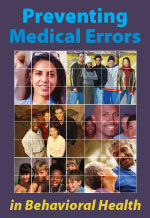Our 6th day of Christmas daily deals in our 12 Days of Christmas promotion are:
CE Credit: 2 Hours
Regular Price: $32
50% Off Today Only: $16!
This course addresses the impact of medical errors on today’s healthcare with a focus on root cause analysis, error reduction and prevention, and patient safety. It satisfies the requirements of the Florida State Legislature mandating a 2-hour course relating to the prevention of medical errors as part of the licensure and renewal process for health professionals. Course #20-63 | 2011 | 30 pages | 14 posttest questions
Click here to order now! Sale ends @ midnight.
Preventing Medical Errors in Behavioral Health is intended to increase clinicians’ awareness of the types of errors that can occur within mental health practice, how such errors damage clients, and numerous ways they can be prevented. Its emphasis is on areas within mental health practice that carry the potential for “medical” errors. Examples include improper diagnosis, breach of confidentiality, failure to maintain accurate clinical records, failure to comply with mandatory abuse reporting laws, inadequate assessment of potential for violence, and the failure to detect medical conditions presenting as psychiatric disorders (or vice-versa). It includes detailed plans for error reduction and prevention like root cause analysis, habitual attention to patient safety, and ethical and legal guidelines. The course includes numerous cases illustrations to help demonstrate common and not-so-common behavioral health errors and specific practices that can help clinicians become proactive in preventing them. * This course satisfies the ethics requirement for biennial relicensure for Florida mental health professionals. Course #20-64 | 2010 | 31 pages | 15 posttest questions
Preventing Medical Errors in Speech-Language Pathology addresses the impact of medical errors on today’s healthcare with a focus on root cause analysis, error reduction and prevention, and patient safety. Multiple scenarios of real and potential errors in the practice of speech-language pathology are included, along with recommended strategies for preventing them. Evidence shows that the most effective error prevention occurs when a partnership exists among care facilities, health care professionals, and the patients they treat. Suggested strategies for preventing errors address all three elements: (1) models for changing the culture in care facilities, (2) lifelong learning for SLPs that is focused on ethical, evidence-based, culturally competent practice and (3) tools for educating and empowering patients. * This course satisfies the medical errors requirement for biennial relicensure for Florida speech-language pathologists and audiologists. Course #20-66 | 2010 | 33 pages | 16 posttest questions
Preventing Medical Errors in Nutrition & Dietetics addresses the impact of medical errors on today’s healthcare with a focus on root cause analysis, error reduction and prevention, and patient safety in the practice of nutrition and dietetics. Real life stories, ethical considerations, health literacy and growing health consumerism are addressed. Also included are tips for distinguishing scientific from pseudoscientific treatment claims and for improving communication with patients. Printable hand-outs, a glossary and online resources are provided. * This course satisfies the requirements of the Florida State Legislature mandating a 2-hour course relating to the prevention of medical errors as part of the licensure and renewal process for health professionals. Course #20-65 | 2011 | 30 pages | 15 posttest questions
Don’t forget to like our Facebook page to be entered in the drawing for a FREE course! Drawings held daily December 14-25.
Professional Development Resources is approved as a provider of continuing education by the Association of Social Work Boards (ASWB #1046); the National Board of Certified Counselors (NBCC#5590); the American Psychological Association (APA); the National Association of Alcoholism & Drug Abuse Counselors (NAADAC #000279); the Commission on Dietetic Registration (CDR #PR001); the Continuing Education Board of the American Speech-Language-Hearing Association (ASHA #AAUM); the American Occupational Therapy Association (AOTA #3159); and various state licensing boards.





